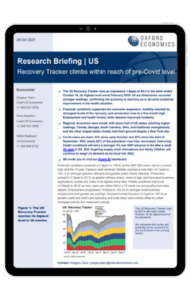US Recovery Tracker climbs within reach of pre-Covid level

The US Recovery Tracker rose an impressive 1.5ppts to 99.3 in the week ended October 15, its highest level since February 2020. All six dimensions recorded stronger readings, confirming the economy is warming up in Q4 amid sustained improvement in the health situation.
What you will learn:
- Financial conditions supported the economic expansion, mobility reached its strongest levels of the recovery, and production rose to a five-month high.
- Employment and health firmed, while demand improved modestly.
- Regional recoveries were mixed, with about half of US states notching higher readings. Florida, Georgia, North Carolina, Ohio, and California strengthened, and the other largest states mostly held their ground despite a New York slip.
- Covid cases are down 34% since early October and 57% since the start of September. With nearly 60% of the population now fully vaccinated, improving health conditions will drive a stronger 4% real GDP advance in Q4 after a weak 2% gain in Q3. Still, lingering supply chain disruptions and sticky inflation will continue to weigh on demand as we head into 2022.
Tags:
Related Services

Post
Little by little—Manchester is closing the output gap
Greater Manchester has led the UK economy since 2008, driven by knowledge jobs, transport upgrades, and housing growth—but can prosperity reach its outer districts?
Find Out More
Post
Asia’s cities are reshaping the world
From Seoul to Delhi and Shanghai, Asia’s urban centres are rapidly overtaking global rivals as living standards soar. What will this mean for the balance of global economic power?
Find Out More